|
Practice vlog. I tend to not talk much. That's part of this whole experiment. Get over any nervousness around playing music on camera. At the end of the day, it's not so bad. In fact, It's a lot like those first couple times you go out to play your songs in public. It's a little nerve-wracking at first but eventually, you start to warm up to the feeling of putting yourself out there... Have courage to take the action and learn from your mistakes. Here's my Intentional vocal practice. Question. What did you notice about what and how I'm improvising? if you were practicing music in this way, what would you do differently? Comments here (or on youtube)
Thanks for being awesome. when should you listen in context? Do you solo out tracks and mix them by themselves? What does it mean to keep things in context? The most important tools are your ears and your mind. Use them, trust them. If it sounds good it sounds good. but remember the context. From your sound in the space it's in, to the interaction of frequencies in your mix. listening in context Reference mixes can help you understand how your track is sounding compared to other songs. If you're listening to a playlist, and one song is drastically quieter than the one before it, thats no good. Reference mixes can help you avoid that. using ducking. if you hear a displeasing sound in your guitar track, a useful trick (if it is supported by your hardware) is called ducking (or listening in place.) This is basically just turning down everything, and keeping the track that has your attention at the forefront. imagine it like a lens through which you can still seee what's happening in the rest of the song as you're doing surgery on that guitar track. the mix-engineer's skill-setTrust your ears If it feels right, it probably is. I've seen many an indie go way overboard with mixing each individual track to perfection, only to to turn off solo and have to do it again. They end up to their necks in audio problems they barely understand. striking a balance between tracks vs tracks, & tracks just sounding good on their own. Solo out that track and it sounds fine alone but in the mix it sounds wrong. What is actually happening and why? Which interaction of instruments/tracks is causing that? Use solo to find that. Remember that sounds interact with other sounds. Just because one track is a vocal and another is a guitar doesn't mean frequencies are not competing for space. The sound is combined and played back through your sound system, and if you're not mixing in headphones, they're interacting with your room too. why it mattersSaving time - repeated steps - do-overs So how to conclude this article, and mix it right. If you're having to solo out a track, tweak it to get it sounding perfect, and then start over again to get it sounding good in context, You're doing it twice. You don't have to. Don't worry, these skills are like learning a new instrument. they come with time and practice. Luckily we live in an age where people are sharing their years of skills and experience for free on the internet. Need some tips? Let me google that for you...
a quick and dirty guide to 'getting the bass right'My biggest piece of advice is to use what you have, trust your ears. To get really great at mixing takes time and practice. Focus on geting the best sound you can from the tools and knowledge you've got. Trust that as you do more and more, your skillset will improve, and so will your mixes Low End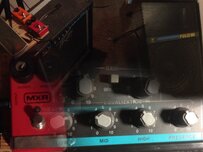 let's say you're looking for a deep-warm tone. It sounds great on a good sound-system, but it doesn't show up on small speakers. what do you do?What do you do is not a question that can be directly answered yet; that is, unless you already know what your options are, and in that case, you probably already have your problem solved. what are you trying to achieve?let's start here instead. Okay, so lets say your genre is indie rock. It's a song that's driven by the guitars and the vocals. 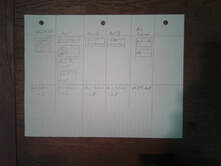 great, now which instruments live in the low-end. commonly this will be drums and bass (kick, toms, Bassline, the bottom of the guitar, and the deepest part of the vocal. The bass doesn't cut through? ask yourself which instrument and why? what is happening in the low-end?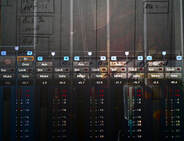 The kick drum sounds good, the guitar/vocal sounds fine. the bassline doesn't cut. It doesn't always need to be front and center, It can act as the glue to hold the song together. When you move away from your good sound-system to your laptop/earbuds/car stereo/mobile. it seems to disappear completely. how can you approach thisA few areas to consider.
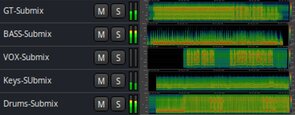 Imagine your low-end in 3 bands. you've got sub-frequencies, Low-frequencies, and precieved low-frequencies (low-mids and above) Check for trouble areas in the context of these three 'bands' EQ is your most powerful tool! try to find the frequency range you're looking for using your solo function to listen for which tracks might be competing for 'space', for example, the bass if it's most present at 80Hz, but the guitar is 'masking' the bass up between 160- 300Hz. You might also have low-frequency energy competing in tracks where it has no business being. here, a hi-pass filter would be your friend. For example, The bass is warm and present between 60-160hz, but adds nothing above that. because it's being covered up by another instrument, A small set of laptop/phone speakers may lack clarity at frequencies below (approximately) 200-300Hz. They have the most presence between 1-5kHz. if you can let the bass through within these ranges (again these numbers are guestimates, every mix is different) you can achieve a more consistant tone across sound-systems.
|
Gene Media ProductionsCody Gene: Record Producer Music Methodology & Creative Lifestyle
#
All
Archives
April 2024
|
Categories
|
AboutGene Media Creative Studio is the Production Facility of Indie-Rock producer and songwriter Cody Gene.
|

Gene Media Creative Studio is located in British Columbia, Canada and creative Cody's creative space. here he explores ideas, creative vision, and technical aspects of independent music production + artist development.
|
Contact |

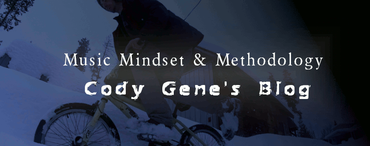

 RSS Feed
RSS Feed